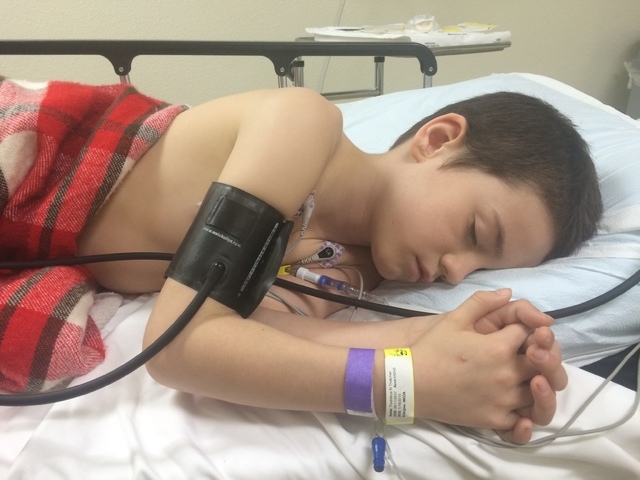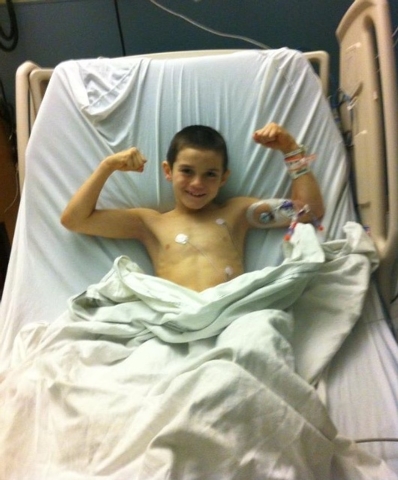Inaugural Marrowthon to raise awareness for marrow registry


The effort is called Be the Match, but it might as well be called Be the Hero. It asks regular residents to see if their DNA might save the life of another by signing up for the marrow registry.
People can sign up for the national bone marrow registry at the inaugural Las Vegas Marrowthon, a 5K walk/run and tot-trot planned from 6:30 a.m. to 2 p.m. April 11 along the trail at Bruce Trent Park, 8851 Vegas Drive. Volunteers from the American Red Cross and Be The Match On Campus are scheduled to attend to sign people up for the national registry.
The registry is important to Summerlin-area residents Jamie and Chrissie Thatcher because their son, Thaddeus, 7, has leukemia. Before his diagnosis, they said Thaddeus, the youngest of three, was a typical little boy. He rode his bike to school and was busy with football and gymnastics. His sickness came on quickly, starting in September.
“He had a stuffy nose,” Chrissie said. “… He just could not breathe.”
Antibiotics didn’t have an effect, so the doctor treated him for mononucleosis. Thaddeus still didn’t get better. The couple wondered if perhaps it was an adenoids infection. Finally, on Oct. 21, they took him to Summerlin Hospital Medical Center, where tests were run. The couple were ushered into a back room and given a definitive diagnosis: T-cell leukemia. Their son’s nose, chest cavity and stomach were filled with tumors.
“It was a shock, to say the least,” Chrissie said. “… They told us he had a 70 percent chance of survival, which, in their eyes, was a good thing. But we were, like, ‘That means he has a 30 percent chance of not making it.’ “
Treatments would take 3½ years, and chemotherapy began the next day at the Children’s Specialty Center of Las Vegas, 3121 S. Maryland Parkway. Thaddeus was there for about five days a week in the months that followed. His parents’ fears were underscored as other children they met at Summerlin Hospital’s children’s ward, also there for leukemia, got worse or died.
Thaddeus responded to the treatments, and while he does not need a marrow transplant at this time, the Thatchers know it’s a future possibility. They are raising awareness for Be The Match, knowing that there are leukemia patients of all ages who are in need of a transplant.
Kaitlyn Fishman, community engagement director for Be The Match’s Southwest District, which covers Arizona, Nevada and New Mexico, said each year, about 60,000 people sign up to be donors across America. Approximately 6,100 are matched and transplanted. Each person who signs up means another possible match for a person facing cancer.
“It’s different for each person (whether they find a match),” Fishman said. “A lot of it depends on their ethnicity. If they’re not Caucasian, the chances of finding a match are normally smaller than if they were (Caucasian).”
Fishman said a match is first sought within the family, as there is a 25 percent chance that a sibling can donate. After that, they look to the national registry for a match from the general population. There is no cost to the donor, and the recipient’s insurance is billed for the rest.
Receiving DNA is more traumatic than being a donor. The recipient has to be prepared to accept the donated cells, which means they must undergo a strong dose of chemotherapy to “wipe out their immune system,” Fishman explained.
“It’s very tough on a patient … though the actual transfer is just like a blood transfusion,” she said.
Be The Match relies on financial contributions to help cover the $100 cost associated with adding each new member to the registry. This family-fun event will allow Be The Match to continue making it possible for ordinary people to become part of every patient’s search for a marrow donor. Funds will help to grow the registry, provide patients with necessary care and support services and allow for breakthrough research to continue.
If the registry is free and possibly helps someone else, why don’t more people check to see if they can donate?
“There are so many myths associated with it,” Fishman said. “Some are afraid … they think it’s much scarier and more invasive than it is. A lot of times, it’s similar to donating platelets of plasma.”
All it takes to join the registry is a cheek swab to get DNA.
Race registration costs are $30 for adults 18 or older, $24 for teens 13 to 17 and $12 for children 12 or younger and includes a race T-shirt, nutritional snacks and water. It is free to join the marrow registry. Proceeds will benefit Be The Match.
Registration is set to begin at 6:30 a.m., and pre-race Zumba is planned for 7:40 a.m. The tot-trot is set from 7:45 to 8:15 a.m., with more Zumba at 8:20 a.m. The 5K is set to start at 8:30 a.m.
For more information or to register for the race as an individual or team, visit bethematchfoundation.org/lvmarrowthon.
To reach Summerlin Area View reporter Jan Hogan, email jhogan@viewnews.com or call 702-387-2949.
Las Vegas Marrowthon
People can sign up for the marrow registry at the inaugural Las Vegas Marrowthon, a 5K walk/run and tot-trot planned from 6:30 a.m. to 2 p.m. April 11 at Bruce Trent Park, 8851 Vegas Drive.
For more information or to register for the race as an individual or team, visit bethematchfoundation.org/lvmarrowthon.
For more information about registering for the marrow registry, which is free, visit bethematch.org.












